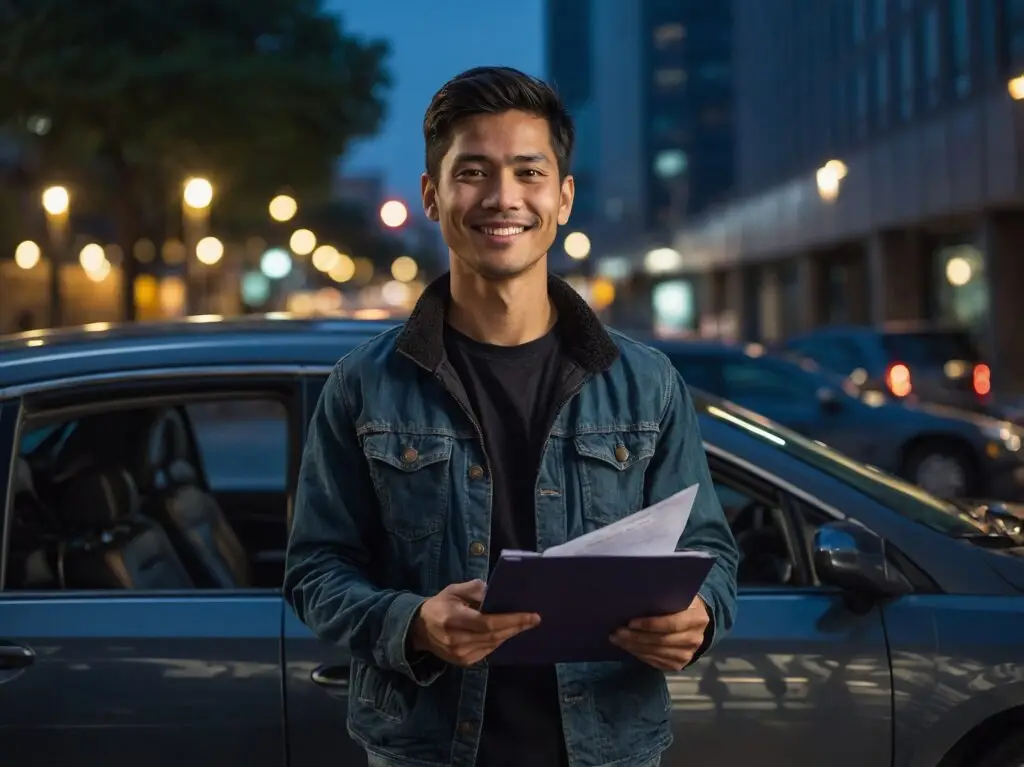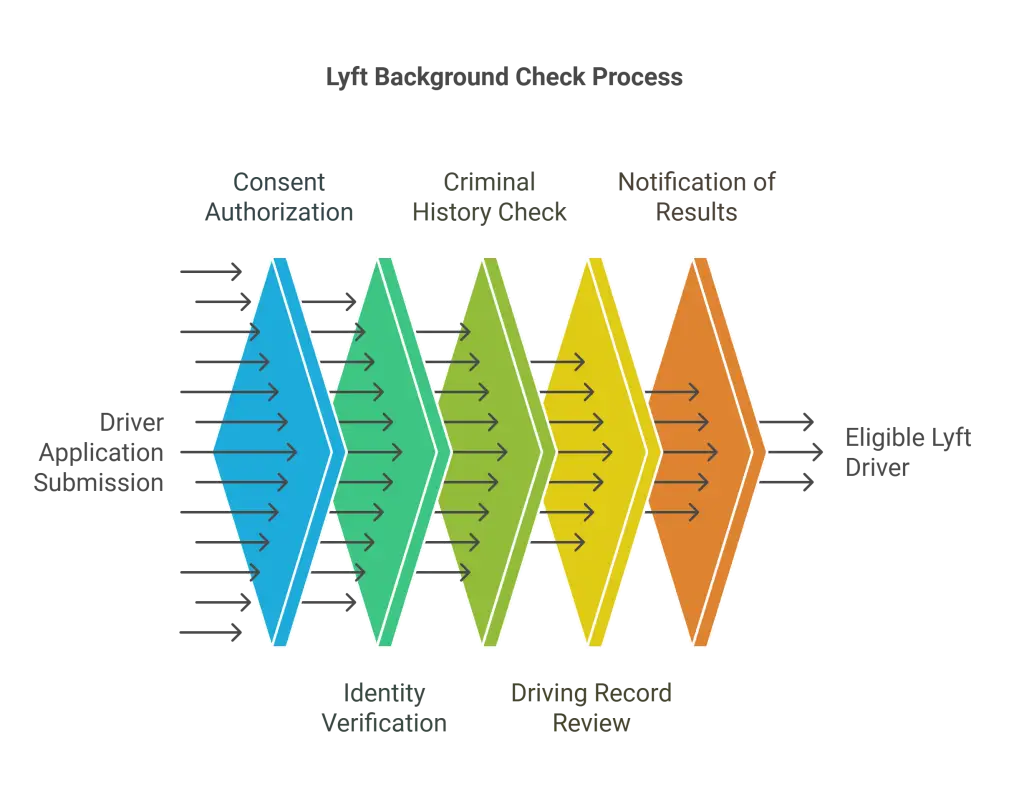Are you thinking about becoming a rideshare driver? One critical step in the application process is passing a background check. Whether you’re aiming to drive for Uber or Lyft, understanding what the background check entails and how it varies from state to state is essential. This guide delves into the specifics of the Uber and Lyft background checks and provides a comparative analysis to ensure you’re well-prepared.
Key Takeaways
- Both Uber and Lyft conduct comprehensive background checks, examining criminal history and driving records to ensure passenger safety and driver integrity.
- Background check criteria typically include disqualifying factors such as felony convictions, serious misdemeanors, DUIs, and major driving violations within the past 7 years.
- State regulations significantly influence background check requirements, with variations in criteria, frequency, and specific disqualifications across different states.
- Applicants have rights under the Fair Credit Reporting Act (FCRA) and can dispute errors found in their background checks.
- Preparing for a background check involves gathering necessary documentation, reviewing your own background, and understanding potential red flags that may affect your application.
Introduction
The rideshare industry is booming, offering the allure of flexible income and the freedom to be your boss. Whether you're considering signing up with Uber or Lyft, one key hurdle stands between you and the open road: the background check. These checks are more than red tape—they ensure passenger safety and driver integrity. In this article, we will dive deep into the specifics of background checks for both Uber and Lyft, highlighting key differences, similarities, and state-specific variations. Gear up to understand what awaits you in this crucial step of becoming a rideshare driver.
EXPERT INSIGHT: Rideshare platforms have surged in popularity over the past few years, acting as positive disruptors in the transportation industry. Despite being a relatively new system, they are not exempt from established background check screening processes. In a high-trust environment where passengers hail private rides with unknown drivers, confidence in the thorough vetting of drivers is paramount. This not only ensures the safety of both drivers and passengers but also protects the image of the rideshare company. Whether you're looking to become a driver or are a passenger curious about the background check process, this article is for you. - Emile Garcia, SHRM-SCP, CHRP, CHRBP
The Importance of Background Checks for Rideshare Drivers
Safety and Trust: Background checks are the backbone of rideshare safety. When passengers hop into an Uber or Lyft, they trust they're in the hands of someone vetted. These checks sift out individuals with problematic histories, ensuring each ride is as safe as possible. It's not just about screening for major crimes; even minor infractions can signal potential issues that might compromise passenger safety.
Regulatory Requirements: Background checks aren’t just a company policy but a legal necessity. Both Uber and Lyft are bound by state and federal regulations that dictate a thorough vetting process. Compliance with these regulations means adhering to stringent standards that cover everything from criminal records to driving history. The aim is to protect passengers and uphold public safety standards.
Responsibility: Selecting the right drivers is more than a checkbox exercise for rideshare companies—it's a commitment to responsible business practices. A solid background check process helps maintain Uber and Lyft's reputations, fostering trust in their services. It’s about ensuring that every driver behind the wheel is reliable and poses no threats. This level of responsibility reassures passengers that they're in good hands, cementing the company's standing as a trustworthy mode of transportation.
What is an Uber Background Check?
An Uber background check is a comprehensive review process to ensure that all drivers meet stringent safety and reliability standards. This check includes several steps and criteria to protect passengers and uphold Uber’s reputation.

Process
The process starts with your application. Once you submit your personal information, Uber partners with third-party background check services such as Checkr. These services conduct detailed investigations into your criminal and driving history.
Criteria
Criminal History
Uber's criminal background check examines several aspects:
- Felonies: Convictions for violent crimes, sexual offenses, or serious felonies generally disqualify applicants.
- Misdemeanors: Less severe crimes like theft, vandalism, and public intoxication are also reviewed. Any recent convictions in this category can be a red flag.
Driving Record
- Infractions: Uber scrutinizes your driving record for moving violations, such as speeding, DUI, or reckless driving. Multiple infractions or serious offenses can bar you from driving.
- License Status: Your driver's license must be current and valid. Suspensions or revocations disqualify applicants.
Frequency
Uber doesn't just conduct these checks during the initial application. Background checks are periodically refreshed to ensure ongoing compliance with their safety standards. This frequency can vary by state and organizational policies, but on average, Uber re-screens its drivers annually.
Understanding these aspects of the Uber background check will help you prepare adequately and set realistic expectations as you start your journey as a rideshare driver.

What is a Lyft Background Check?
A Lyft background check is a critical screening process to ensure drivers' and passengers' safety and security. It involves thoroughly examining an applicant's criminal history and driving record to determine their eligibility to operate as a Lyft driver.

Process
The Lyft background check process kicks off once you've submitted your application. Here's a step-by-step breakdown:
- Application Submission: You must provide basic personal information, including your full name, address, and Social Security number.
- Consent: You must authorize Lyft to conduct the background check, agreeing to their terms and conditions.
- Information Verification: Lyft verifies your identity and checks the information you provide against various databases.
- Criminal History Check: Lyft partners with third-party companies like Checkr to run a criminal background check.
- Driving Record Check: Your driving history is reviewed for infractions like DUIs, reckless driving, and other major violations.
- Notification: You'll be notified of the result via email, and you can check the status of your background check through the Lyft driver portal.
Criteria
Criminal History
Lyft's criminal background check scrutinizes your record for the following:
- Felonies: Lyft disqualifies individuals with a felony conviction within the past seven years.
- Misdemeanors: Serious misdemeanors, especially those involving violence, theft, or drugs, are also grounds for disqualification.
- Sex Offender Registry: Being listed on the National Sex Offender Registry is an automatic disqualification.
- Pending Charges: Any pending charges for disqualifying offenses will result in disqualification until the charges are resolved.
Driving Record
Lyft examines your driving record for various infractions, including:
- DUIs: DUI convictions within the past seven years are disqualifying.
- Reckless Driving: A history of reckless driving offenses makes you ineligible.
- License Status: Your driver's license must be active and in good standing.
- Minor Violations: Too many minor infractions (e.g., speeding tickets) can disqualify you.
Frequency
Lyft conducts initial background checks when you apply and then runs annual checks to ensure ongoing compliance. Additionally, they monitor drivers' records continuously for any new infractions or criminal activities to maintain a safe platform for everyone.
By understanding the Lyft background check process, its strict criteria, and the frequency of these checks, you can better prepare yourself to meet the company's standards and embark on your journey as a Lyft driver.
Comparative Analysis: Uber vs. Lyft Background Checks
There are more similarities than differences regarding Uber and Lyft background checks, though the nuances can affect your chances as a driver candidate. Let’s break it down.

Similarities
Both Uber and Lyft adhere to fundamental criteria when it comes to background checks:
| Criminal History | Each company sifts through national, state, and local databases to screen for serious crimes, such as felonies and violent misdemeanors. |
| Driving Record | Both services look for major driving infractions, such as DUIs, hit-and-runs, and reckless driving. |
| Frequency | Uber and Lyft don’t just stop at the initial check. They perform periodic checks to ensure ongoing compliance with their standards. |
Regulatory compliance is non-negotiable for both platforms. They must meet local and federal laws to maintain their operating licenses, which means background checks are closely aligned with public safety regulations.
Differences
However, don’t let these commonalities fool you into thinking the checks are identical. The devil is in the details.
| Specific Disqualifications | Uber tends to have stricter zero-tolerance policies, especially in states with tighter regulatory oversight. For example, Uber may be disqualified for certain lower-level offenses that Lyft overlooks, such as non-violent misdemeanors. |
| Process Variations | When it comes to processing, Uber utilizes Checkr for its background screenings, while Lyft employs Sterling Talent Solutions. Although both are reputable services, the speed and efficiency of these checks can vary slightly, with Uber's process often being a bit faster due to streamlined protocols. |
| State-to-State Variations | Regarding processing, Uber utilizes Checkr for its background screenings, while Lyft employs Sterling Talent Solutions. Although both are reputable services, the speed and efficiency of these checks can vary slightly, with Uber's process often being a bit faster due to streamlined protocols. |
For prospective drivers, understanding these nuances can be the difference between a smooth onboarding process or a frustrating disqualification. It's crucial to know not only what these companies are looking for but also how local regulations may influence the outcome of your background check.
State Variations in Background Checks
Background checks for rideshare drivers aren't one-size-fits-all across the United States. State laws play a crucial role in shaping the criteria and processes for these checks, influencing how Uber and Lyft scrutinize their potential drivers. Let’s dive into a few examples:
California
California has stringent requirements for background checks, primarily influenced by its regulatory framework aimed at protecting consumers. In California, Uber and Lyft must ensure that drivers do not have convictions for certain serious offenses within the past seven years, such as violent felonies or sexual crimes. Additionally, the California Public Utilities Commission (CPUC) mandates annual background checks, making the state one of the more rigorous in terms of driver vetting.
New York
New York also imposes detailed background check requirements, but with unique twists. In this state, rideshare companies must conduct a thorough investigation, which includes criminal history and driving record checks, facilitated by the Taxi and Limousine Commission (TLC). The checks extend to fingerprinting, a step not necessarily required in all states. This added layer ensures that drivers meet high safety and reliability standards before they hit the streets.
Texas
Everything is bigger in Texas, including the level of scrutiny for rideshare drivers. Texas law requires comprehensive background checks that go back seven years to include criminal history and driving records. Specific disqualifications include felonies, DUIs, and violent crimes. Unlike California, Texas does not mandate annual rechecks, but companies often voluntarily adhere to regular assessments to maintain safety standards.
Legal Resources
For those seeking more information, it’s crucial to consult official legal resources to understand state-specific regulations better. The Federal Trade Commission (FTC) and the Equal Employment Opportunity Commission (EEOC) provide valuable guidelines and legal texts that can help clarify your rights and obligations.
Understanding these state-by-state variations can better prepare you for the background check process, ensuring a smoother path to becoming a rideshare driver.
Legal Considerations and Your Rights
Fair Credit Reporting Act (FCRA)
Regarding background checks, the Fair Credit Reporting Act (FCRA) is your ally. Under the FCRA, you can be informed when a background check is conducted and consent to it. If the results of the background check impact your application negatively, the company must provide you with a copy of the report and a summary of your rights before taking any adverse action. This transparency ensures you're not blindsided by findings you didn’t expect.
EEOC Guidelines
The Equal Employment Opportunity Commission (EEOC) guidelines prevent discriminatory practices in employment background checks. Whether Uber or Lyft, companies must comply with these guidelines, which prohibit discrimination based on race, color, national origin, sex, or religion. The EEOC ensures that background checks are fair and that any disqualifications are based on job-related criteria rather than discriminatory practices.
Disputing Errors
Mistakes in background checks can happen, and they can cost you a driving opportunity. If you find errors in your background check, you have the right to dispute them. Start by requesting a recheck from the company that conducted the background check. Provide any documentation that disproves the error. If this doesn’t resolve the issue, you can file a complaint with the Consumer Financial Protection Bureau (CFPB) or take legal action if necessary. Remember, accurate information is your right, and you have the tools to correct inaccuracies.
Frequently Asked Questions (FAQ)
What happens if I fail a background check for Uber or Lyft?
If you fail a background check for Uber or Lyft, you'll receive an official notification outlining the reason for disqualification. Each company has specific criteria, such as certain criminal convictions or driving infractions, that could lead to disqualification. Once disqualified, you cannot drive for that particular company.
Can I reapply if I’m disqualified?
Yes, you can reapply after a certain period, usually three to six months. However, reapplying may yield the same results unless your record changes to address the disqualifying factor. Take time to resolve any issues before reapplying.
How long does the background check process take?
The background check process typically takes anywhere from three to seven days. However, this can vary depending on the completeness of your documentation and the specific state laws that may require additional verification steps.
Are background checks paid for by the applicant or the company?
Background checks for both Uber and Lyft are generally paid for by the company. You don't typically need to worry about any out-of-pocket expenses for this part of the application process.
Can I see my background check results?
Yes, you have the right to see your background check results. When you receive notification of your background check completion, there will usually be instructions on accessing your results. This transparency helps ensure accuracy and allows you to dispute any discrepancies.
Preparing for a Background Check
Gather Documentation
Before initiating the rideshare application process, ensure you've gathered all necessary documents. This typically includes your driver's license, vehicle registration, proof of insurance, and social security number. Having these documents ready will make the background check process faster and smoother.
Review Your Background
It's smart to run a background check on yourself to see what Uber and Lyft will see. This allows you to review and address any inaccuracies or red flags before they do. Services like GCheck can help you comprehensively examine your criminal history and driving record.
Understand Red Flags
Certain elements in your background check can disqualify you from becoming a rideshare driver. Common red flags include DUIs, major driving violations, recent criminal convictions, and a history of violent crime. If you find any of these issues in your background check, it's a good idea to consult legal advice on how best to address them. For more in-depth information on common red flags, visit the GCheck blog.
By taking these preparation steps, you'll be better positioned to pass your background check smoothly and earn with Uber or Lyft.
Conclusion
Background checks are more than just a procedural hurdle; they're a cornerstone for building trust and ensuring safety in the rideshare ecosystem. By thoroughly vetting drivers, companies like Uber and Lyft can maintain a secure environment for passengers and reinforce their reputations.
To streamline your application process, gather all necessary documents and review your background ahead of time. This proactive approach can help you address potential red flags before they become roadblocks.
Remember, the rideshare industry holds immense potential for flexible income and new opportunities. By understanding and preparing for the background check process, you're not just a step closer to getting behind the wheel; you're contributing to a safer, more reliable service for everyone involved.
Additional Resources
- Background Checks for HR and Recruitment Agencies: The Essential Handbook
- Can You Fail a Background Check and Still Get Hired?
- Non-CDL Driver Requirements: Drug Tests and Background Checks Explained
- Non-CDL Driver Requirements: Drug Tests, Physicals, and What to Expect
- How to Get a Background Check for Yourself: A Step-by-Step Guide

GCheck Editorial Team
Meet the GCheck Editorial Team, your trusted source for insightful and up-to-date information in the world of employment background checks. Committed to delivering the latest trends, best practices, and industry insights, our team is dedicated to keeping you informed.
With a passion for ensuring accuracy, compliance, and efficiency in background screening, we are your go-to experts in the field. Stay tuned for our comprehensive articles, guides, and analysis, designed to empower businesses and individuals with the knowledge they need to make informed decisions.
At GCheck, we're here to guide you through the complexities of background checks, every step of the way.





